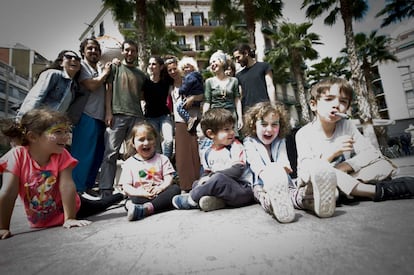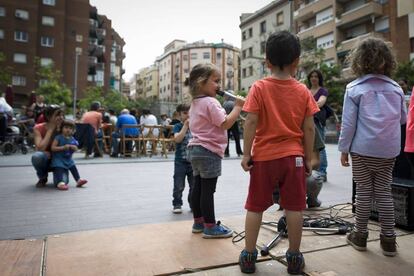The Spanish parents opting for a tribal education
A perceived lack of stimulation in the school system and the cost of childcare is prompting some families to pool resources

“I’m going to paint my hair!” sings four-year-old India from the improvised stage in a square in the neighborhood of Poble Sec in Barcelona.
Surrounded by her friends and companions in the homespun nursery where she is being brought up, India is one of the tribal set. “Babalia began in 2011 as a parenting project in which various families got together to share the job,” explains India’s mother, Julia Le-Senne, 27.
This tribal model of nursery education is growing rapidly, not only due to the lack of places at public nurseries and the cost of private ones but also because it is seen to make sense for the child. Even left-leaning CUP party spokesperson Anna Gabriel has declared that she is in favor of children being brought up “by the tribe.”
In Barcelona alone there must be 30 of these groups. Catalonia is very keen on this alternative
“Conventional families are not particularly enriching for a child,” said Gabriel, triggering an avalanche of criticism – directed not only at her words but also at this type of education.
“Bringing children up as part of a group is nothing new,” says a a member of ACEIM, the association for kindergartens in Madrid. “It can work, but there are two problems. The first is whether it provides a good base for the next phase of education. The second is that these projects fall below the radar.”
Controversial they may be, but in Spain there are now 130 such groups, according to the alternative database for education, Ludus. “In Barcelona alone there must be 30. Catalonia is very keen on this alternative,” says Le-Senne. “It is really something that people have been doing since time began.”
While India sings, her mother and father cook. Babalia has organized a fideuá party in the neighborhood in which all the parents are involved, though not so much in the care of the children as in the preparations.

When Babalia was first established, each parent took a turn of being “the teacher,” but the idea was abandoned when the kids played up. Now they appoint specific parents to the task. Who they are and how they work is, of course, decided by the group.
“The families don't live together, but they establish a very strong bond,” says Martine Mancini, 31, who takes care of the children along with another parent. From 9am to 4pm, they engage their small charges in different activities inside a building donated by La Base association. But they also go out on expeditions. For example, one day a week they visit an old people’s home, where, as India puts it, they “play with the grandparents.”
The parents pay €220 a month, which is about half what they might pay at a conventional private nursery. The costs are low, partly because of the donated building and partly because of the parents’ cooperation – the 20 families take turns producing an ecological lunch for their children and they also club together for car rides and outings.
The parents pay €220 a month, which is about half what they might pay at a conventional private nursery
“We agree not only on the educational line we want to take, but also on how often we want to go out,” says Le-Senne. “Babalia works because we have an educational model in common. It's really lovely to see how confident the little ones feel in the group.”
The emotional well-being of the children is one thing, but there are those who are concerned that, even at this young age, the children should be schooled in the established system. While not totally against the tribal method, Adela Coello, Vice President of ACEIM and the director of the private nursery Nanos in Madrid since the 1980s, argues: “You would have to see how the child develops and if he or she is as prepared as their peers when it’s time to start school. It’s not that the tribal model can’t work, it’s just that society isn’t ready for this yet. It has been tried at different periods in the past and hasn’t always delivered.”
“I don’t understand why we can’t simply be different,” says Carolina del Olmo, Director of Culture at the Círculo de Bellas Artes, philosopher and author of the book, Where Is My Tribe?, in which she talks about the loss of ideas and values that belonged to the extended family and the community – both of which are in decline.
“People are scandalized by talk of the tribe but it’s clear that the nuclear family no longer works,” she continues. “Taking children to school to be with people they neither know nor choose to be with, or getting a childminder to look after the child all day is now seen as normal. Spending two hours a day with the child themselves is also considered normal. But a parenting group strikes them as madness.”
The inspiration for these groups is often drawn from so-called “free education” philosophy, which is based on respect, confidence building and nurturing the child’s emotional development
Le-Senne believes that children are looked upon as possessions, which is why there is such an individualistic approach to bringing them up. But while modern society sees a child’s development as the responsibility of the parents alone, the tribe considers it to be shared. After all, as Le-Senne points out, “children are our future.”
The inspiration for these groups is often drawn from so-called “free education” philosophy, which is based on respect, confidence building and nurturing the child’s emotional development. In fact, there is a crossover with the Montessori method, which originated at the end of the 19th century, and with Rudolph Steiner’s Waldorf schools.
In an era in which creativity is so highly appreciated, more and more people are keen to offer their children a different, more stimulating education. In Britain, the popularity of Montessori schools has rocketed by 65% since Prince George started attending one in Norfolk after Christmas. And according to research from Yale University, 300 state schools have introduced the Montessori method to the classroom in the US in the past 15 years.
“The children can develop in an environment of love and respect without pressure,” explains Pam, another mother from the Poble Sec tribe.
By definition, tribal nurseries stop at the age of six. Subsequently, the children will be obliged to pore over text books and memorize the names of numerous mountains and rivers, though the perceived dryness of the Spanish education system has also seen a surge of alternatives in primary and secondary education, such as the Roure School in Alto Penedés, which takes children up to the age of 16, or the Escuela Libre Micael in Madrid.
We have created a community and a network of support. We don’t share the parenting because we’re not that organized
When their children are older, many parents feel confined by the demands of society to remain within the system, but at nursery level, the tribal option is gaining momentum. Martha Monaster, mother of two, belongs to the Arganzuela Tribe, a group of parents who support each other in the Arganzuela neighborhood of Madrid.
“We have created a community and a network of support. We don’t share the parenting because we’re not that organized,” she says.
For some reason, there is an association between this method and what happened on the Israeli Kibbutz, which was famous for communal childrearing. In fact, the urban education tribes have little or nothing to do with Israeli model, which was peculiar to a very specific set of circumstances.
Meanwhile, in the square in Poble Sec, some children are still singing, microphones in hand, but India has deserted the stage and is drawing with chalk on the ground. Close by is a stall filled with children’s clothes and shoes. These have been donated by the families and are on sale for a euro or two. “Instead of buying everything new, we recycle and the money helps support Babalia,” explains India’s mother, whose parting words are: “Now that we don’t have family clans, we have our tribe.”
English version by Heather Galloway.
Tu suscripción se está usando en otro dispositivo
¿Quieres añadir otro usuario a tu suscripción?
Si continúas leyendo en este dispositivo, no se podrá leer en el otro.
FlechaTu suscripción se está usando en otro dispositivo y solo puedes acceder a EL PAÍS desde un dispositivo a la vez.
Si quieres compartir tu cuenta, cambia tu suscripción a la modalidad Premium, así podrás añadir otro usuario. Cada uno accederá con su propia cuenta de email, lo que os permitirá personalizar vuestra experiencia en EL PAÍS.
¿Tienes una suscripción de empresa? Accede aquí para contratar más cuentas.
En el caso de no saber quién está usando tu cuenta, te recomendamos cambiar tu contraseña aquí.
Si decides continuar compartiendo tu cuenta, este mensaje se mostrará en tu dispositivo y en el de la otra persona que está usando tu cuenta de forma indefinida, afectando a tu experiencia de lectura. Puedes consultar aquí los términos y condiciones de la suscripción digital.









































